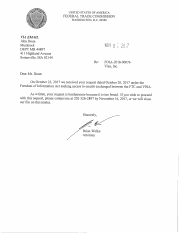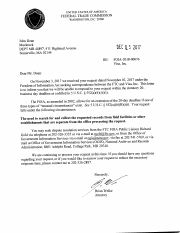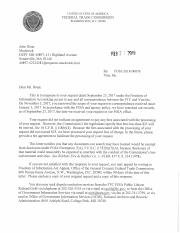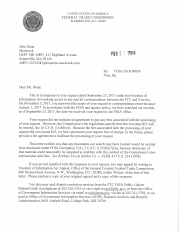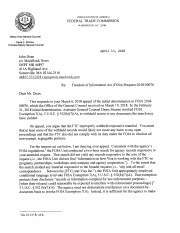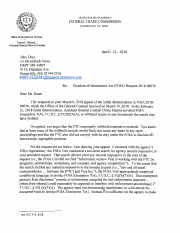Communications with Visa Inc.
| Tracking # |
2018-00076 FOIA-2018-00076 |
| Submitted | Oct. 20, 2017 |
MuckRock users can file, duplicate, track, and share public records requests like this one. Learn more.
Communications
From: John Doan
To Whom It May Concern:
This is a request under the Freedom of Information Act. I hereby request the following records:
1. Any and all correspondence since 1/1/2016 between the Federal Trade Commission via letters, civil investigative demands, or emails and Visa Inc. Including any correspondence to employees of Visa Inc., Visa U.S.A Inc and any email correspondence with any email address ending in @visa.com.
The requested documents will be made available to the general public, and this request is not being made for commercial purposes.
In the event that there are fees, I would be grateful if you would inform me of the total charges in advance of fulfilling my request. I would prefer the request filled electronically, by e-mail attachment if available or CD-ROM if not.
Thank you in advance for your anticipated cooperation in this matter. I look forward to receiving your response to this request within 20 business days, as the statute requires.
Sincerely,
John Doan
From: Federal Trade Commission
Hello:
Thank you for your submission. The FTC will review your request.
Best regards,
Federal Trade Commission
From: Federal Trade Commission
Mr. Doan:
Attached is correspondence regarding your FOIA request.
Respectfully,
Brian M. Welke
Attorney | Office of the General Counsel
Federal Trade Commission
600 Pennsylvania Ave NW, Washington, DC 20580
-

image001
From: John Doan
I respectfully modify my request to only email correspondence this year.
Any and all email correspondence since 1/1/2017 between the Federal Trade Commission and Visa Inc. Including any email correspondence to employees of Visa Inc., Visa U.S.A Inc and any email correspondence with any email address ending in @visa.com.
From: Federal Trade Commission
Mr. Doan,
Which departments of the FTC would you like searched. Since you are requesting the entire agency to search its records, this is still burdensome. Feel free to call if that is easier.
Thanks!
Brian
Brian M. Welke
Attorney | Office of the General Counsel
Federal Trade Commission
600 Pennsylvania Ave NW, Washington, DC 20580
From: John Doan
I apologize I will attempt to be more specific and add some background to the request. In light of the data breaches, fraud and privacy becoming more of an issue, I am attempting to get more information on how Visa is working with the FTC on programs, partnerships, workshops, and company and agency cooperation.
https://www.visasecuritysense.com/en_US/fraud-news.jsp
"While it's unsettling to learn that your payment data may have been stolen, the good news is that in many cases stolen payment data is never actually used to make fraudulent charges. And, in the event that fraud does occur, Visa protects U.S. cardholders through our Zero Liability policy, which ensures that you won't be held responsible for a fraudulent purchase."
"It's important for you to remember you are protected against fraudulent purchases when you use your debit or credit card"
"Knowing that your payment data may have been stolen is unsettling, but the good news is that in most cases stolen payment data is never actually used to make fraudulent charges. "
With that I will attempt to amend my request to be more specific:
Any and all email correspondence since 1/1/2017 between the Federal Trade Commission and Visa Inc. Including any email correspondence to employees of Visa Inc., Visa U.S.A Inc and any email correspondence with any email address ending in @visa.com. E-mails containing any of the words "fraudulent" , "fraud", "merchant", "chargeback", "Bank" or "visanet" in the subject or body of the email.
If that is not specific enough, I would also amend it to all divisions of the bureau of consumer protection.
From: Muckrock Staff
To Whom It May Concern:
I wanted to follow up on the following Freedom of Information request, copied below, and originally submitted on Oct. 20, 2017. Please let me know when I can expect to receive a response, or if further clarification is needed. You had assigned it reference number #2018-00076.
Thanks for your help, and let me know if further clarification is needed.
From: Federal Trade Commission
Mr. Doan,
We are processing your request and no further clarification is needed at this time.
Brian M. Welke
Attorney | Office of the General Counsel
Federal Trade Commission
600 Pennsylvania Ave NW, Washington, DC 20580
From: Federal Trade Commission
An interim response, stating the request is being processed.
From: Muckrock Staff
To Whom It May Concern:
I wanted to follow up on the following Freedom of Information request, copied below, and originally submitted on Oct. 20, 2017. Please let me know when I can expect to receive a response, or if further clarification is needed. You had assigned it reference number #FOIA-2018-00076.
Thanks for your help, and let me know if further clarification is needed.
From: Muckrock Staff
To Whom It May Concern:
I wanted to follow up on the following Freedom of Information request, copied below, and originally submitted on Oct. 20, 2017. Please let me know when I can expect to receive a response, or if further clarification is needed. You had assigned it reference number #FOIA-2018-00076.
Thanks for your help, and let me know if further clarification is needed.
From: Federal Trade Commission
Mr. Doan,
Attached sour response to your FOIA request dated September 23, 2017.
Sincerely,
William "Chip" Taylor
Government Information Specialist
Federal Trade Commission
600 Pennsylvania Ave., NW
Washington, DC 20580
(202) 326-3258
Wtaylor1@ftc.gov
From: John Doan
Thank you for your response.
I appeal the refusal of the FTC to process and release any records responsive to this Freedom of Information Act request FOIA-2018-00076 that was submitted on September 23, 2017.
The FTC indicated that “any documents our search may have located would be exempt from disclosure under FOIA Exemption 7(A), 5 U.S,C. § 552(b)(7)(A), because disclosure of that material could reasonably be expected to interfere with the conduct of the Commission's law enforcement activities.”
The FTC improperly withheld the requested records. Exemption 7(A) permits the withholding of “records of information compiled for law enforcement purposes … to the extent that production of such law enforcement records or information … could reasonably be expected to interfere with enforcement proceedings.” 5 U.S.C. § 552(b)(7)(A). The purpose of Exemption 7(A) is “to prevent harm to the government’s case in court” NLRB v. Robbins Tire & Rubber Co., 437 U.S. 214, 227 (1978); also North v. Walsh, 881 F.2d 1088, 1097 (D.C. Cir. 1989) (Exemption 7(A) is “Designed to block the disclosure of information that will genuinely harm the government’s case in an enforcement proceeding or impede an investigation”). Exemption 7(A) does “not endlessly protect material simply because it was in an investigatory file.” Robbins Tire & Rubber Co., 437 U.S. at 230. Law enforcement records may be withheld only where release “is likely to cause some distinct harm.” Kay v. FCC, 976 F. Supp. 23, 38 (D.D.C. 1997).
To the extent the FTC is contending disclosure of the records could interfere with other enforcement activities, disclosure of records from an active investigation is not foreclosed simply because the investigation is open. Banks v. Dep’t of Justice, 700 F. Supp. 2d 9, 18 (D.D.C. 2010) (“The mere fact that the underlying investigation remains open is not sufficient basis for withholding the entire case file; such a decision is justified only on a showing that the release of each category of documents could reasonably be expected to interfere with enforcement proceedings.”). Even if disclosure of some of the requested records could, if released, interfere with ongoing enforcement proceedings, the FTC cannot withhold all of the records. While I do not know what records or even how many records the FTC possesses (The FTC did not even disclose how many responsive records it found), it is very unlikely all of them are related to ongoing proceedings and their disclosure reasonably could be expected to interfere with those proceedings. It is much more likely that at least some of the requested records would not cause any harm to any open proceedings.
The FTC also did not comply with its duty under the FOIA to disclose all non-exempt, segregable portions of the records. The FOIA requires agencies to “disclose any reasonably segregable portion of a record … after deletions of the portions which are exempt.” 5 U.S.C § 552(b). “[T]he focus in the FOIA is information, not documents, and an agency cannot justify withholding an entire document simply by showing that it contains some exempt material.” Mead Data Central, Inc v. United States Dep’t of Air Force, 566 F.2d 242, 260 (D.C. Cir. 1977). Even if some of the request records contain information related to open law enforcement proceedings and disclosure of that information could reasonably be expected to interfere with those proceedings, it is again very unlikely all of the information in the requested records is exempt. The FTC should have redacted any legitimately exempt information and disclosed the remainder of the records.
The FTC’s initial determination that all of the requested records are exempt under Exemption 7(A) is in error and should be reversed.
From: Federal Trade Commission
Hello, my name is Richard Gold from the Office of the General Counsel at the Federal Trade Commission. I am reviewing the FOIA Appeal that MuckRock News submitted to the FTC and which was received on March 19th.
The appeal relates to the FOIA Unit's response to the 11/3/2017 amended request for any and all email correspondence since 1/1/201 between the Federal Trade Commission and Visa Inc.
The 11/3/2017 email from MuckRock also sets out that you are "attempting to get more information on how Visa is working with the FTC on programs, partnerships, workshops, and company and agency cooperation".
Question: Are you specifically seeking records on whether/to what extent Visa has helped the FTC with consumer education? If so, that could potentially be more releasable under FOIA if they exist as opposed to any records that might exist that fall under 7(A).
Please advise. Thank you.
Richard Gold
Attorney | Office of the General Counsel
Federal Trade Commission
T: (202) 326-3355
From: John Doan
I had revised my request after being told it was not specific enough on 11/3/17. This was the final request as it stood:
Any and all email correspondence since 1/1/2017 between the Federal Trade Commission (all divisions of the bureau of consumer protection) and Visa Inc. Including any email correspondence to employees of Visa Inc., Visa U.S.A Inc and any email correspondence with any email address ending in @visa.com. E-mails containing any of the words "fraudulent" , "fraud", "merchant", "chargeback", "Bank" or "visanet" in the subject or body of the email.
While it is not the most common, requests for email correspondence between the FTC and other companies and organizations are routinely partially granted with appropriate redactions. I agree that there are most likely records that would not fall under 7(A). Just as likely there are records or portions of records that would fall under other exemptions. That was the reason behind the appeal on the blanket 7(A).
I don't agree with the blanket 7(A) that was assigned to this after I was responsive and provided followup and narrowed my searched as requested. This was a request that was around 4 months pending as well. To not even get an approximation of the number of records in the letter, which is fairly common, was also not in line with what I have seen or was expecting. Even an approximation of the number of records would at least give an idea on the scope of the request and could have allowed me to try to narrow the request down further if it was still too burdensome. I was told to narrow the search and then told "any documents our search may have located would be exempt from disclosure".
Only about 5% of FTC FOIAs are "denied in full" based on exemptions and less than 2% seem to be sole 7(A). An even smaller amount are for e-mail communication requests and most are intra/inter-agency such as 2017-01133 or 2017-00406. Sole 7(A) makes more sense in those cases.
I understand your question and reasoning but I don't think that covers it and it seems to add more of a burden. If we say "consumer education", it opens it up for interpretation, it seems it would be more of a burden to try to define and classify each record as "consumer education" than it would be to just classify it according to exemption/redaction guidelines. The administrative guides for FOIA requests, how to respond, what to redact seems to be pretty well defined, laid out by exemption and is fairly straight forward. To have someone review each record / redact / exempt according to guidelines already required, but to also add the additional task of classifying a record into a category that is open to interpretation and not scoped out and defined seems like it is adding more of a burden and a step in the wrong direction.
I am just asking for this FOIA request to be processed as the FTC has processed dozens of other similar requests that they partially granted and redacted. Many of which are public record, some of which are posted on the FTC site itself. My 11/3 e-mail (Specifically the quoted material) gave some background on the reasoning behind the request. I stand by my amended request and my appeal.
Thank you for your help and attempt to resolve this.
From: Federal Trade Commission
The request has been rejected by the agency.
From: Federal Trade Commission
Mr. Doan-
The FOIA Appeal Response from the Federal Trade Commission is enclosed. We will also send this by U.S. mail. Thank you.
Richard Gold
Attorney | Office of the General Counsel
Federal Trade Commission
T: (202) 326-3355
Files
pages
